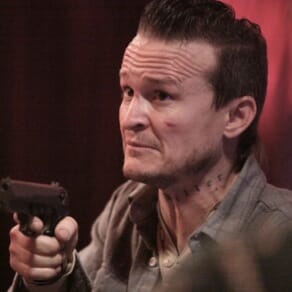Justified: “Thick As Mud” (Episode 3.05)

“This is the price we pay for the life we live.” -Ava Crowder
Someday Justified is going to be one of those shows that mass communications departments spend an entire semester on. Of course, there’s no need to limit it. Many departments could get involved. Classes could be taught in anything from philosophy to sociology to economics to, this week, basic anatomy.
Ethics and the Economy will be taught by Professor Limehouse. Ellstin Limehouse lied to Dickie Bennett. The Bennett fortune still exists (though Limehouse claims it is nowhere near the $3 million that Dickie suggested). The most interesting thing about the scene is that Ellstin is perfectly willing to steal the money, but draws the line at killing Dickie to keep it. As I’ve said before, where the characters draw their lines (and why) is perhaps the strongest point of the show. Certainly the driving force for many residents of Harlan County is economic, but there are apparently limits to how far those reasons can take you. For Limehouse, killing is allowable, but only for specific reasons that seem to go beyond simply money. We’ll see if that holds true as the season goes on.
The Women’s Studies department is going to have a field day with this show. Mags Bennett from last year is the best character the show has produced, but that’s not to say that the other female characters get short shrift. Winona only appears for one scene at the beginning (and another “domestic” scene interestingly) but her presence closes the episode and those bookends provide most of the emotional thrust of the episode. More on that a little later. Ava makes the most of her one scene with Boyd by fully embracing the reality of her new life, showing vulnerability and strength in a moment of doubt for Boyd that shows how deep their bond has gone. Joelle Carter is something of a secret weapon. She was initially interesting as a magnet for Raylan. You could see her as the bouncy teen that he remembered. Two years removed, the façade is gone and we see the adult Ava, the one who has suffered years of abuse, hardship and sadness. That Carter plays both versions without it seeming forced or faked (and with relatively few scenes) is a testament to her abilities. I hope she stays a big part of Boyd’s plans. Or should I say, I hope Boyd stays a big part of hers.
For this week’s main plot, poor misguided Dewey Crowe takes the spotlight (dissertation topic: Racism, Gullibility and Gator Poaching in the Deep South). Prison Nurse Lance has convinced Dewey that his kidneys have been removed (they haven’t been) in order to spur a spree of heists that will land Dewey enough cash to secure said kidneys’ safe return. Raylan and Rachel follow close behind but never seem to be able to get ahead of Dewey despite his complete incompetence at absolutely everything. Dewey is a fascinating character in that he stands in for a large part of the Harlan community. Even on his best day he is ignorant, desperate and morally repugnant. Yet somehow we still sympathize with him and there has been an unspoken treatment of Dewey since he appeared in the pilot that paints him as more victimized than malicious. Despite his tattoos and posturing, he maintains an innocence throughout and you really get the sense that given opportunities and education, he might have led a decent life. Or, at the very least, he might know what kidneys are for.
-

-

-

-

-

-

-

-

-

-

-

-

-

-

-

-

-

-

-

-

-

-

-

-

-

-

-

-

-

-

-

-

-

-

-

-

-

-

-

-








































